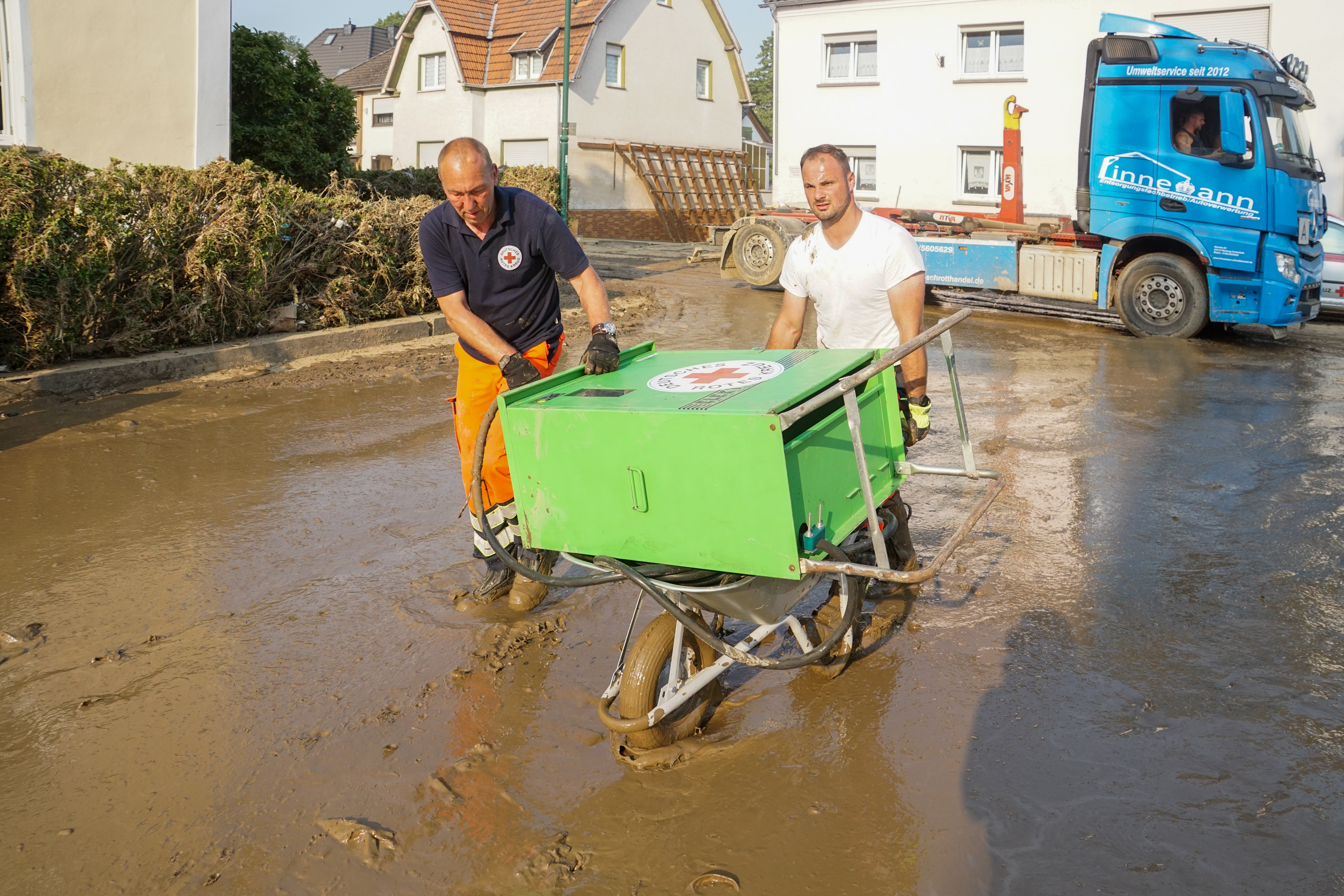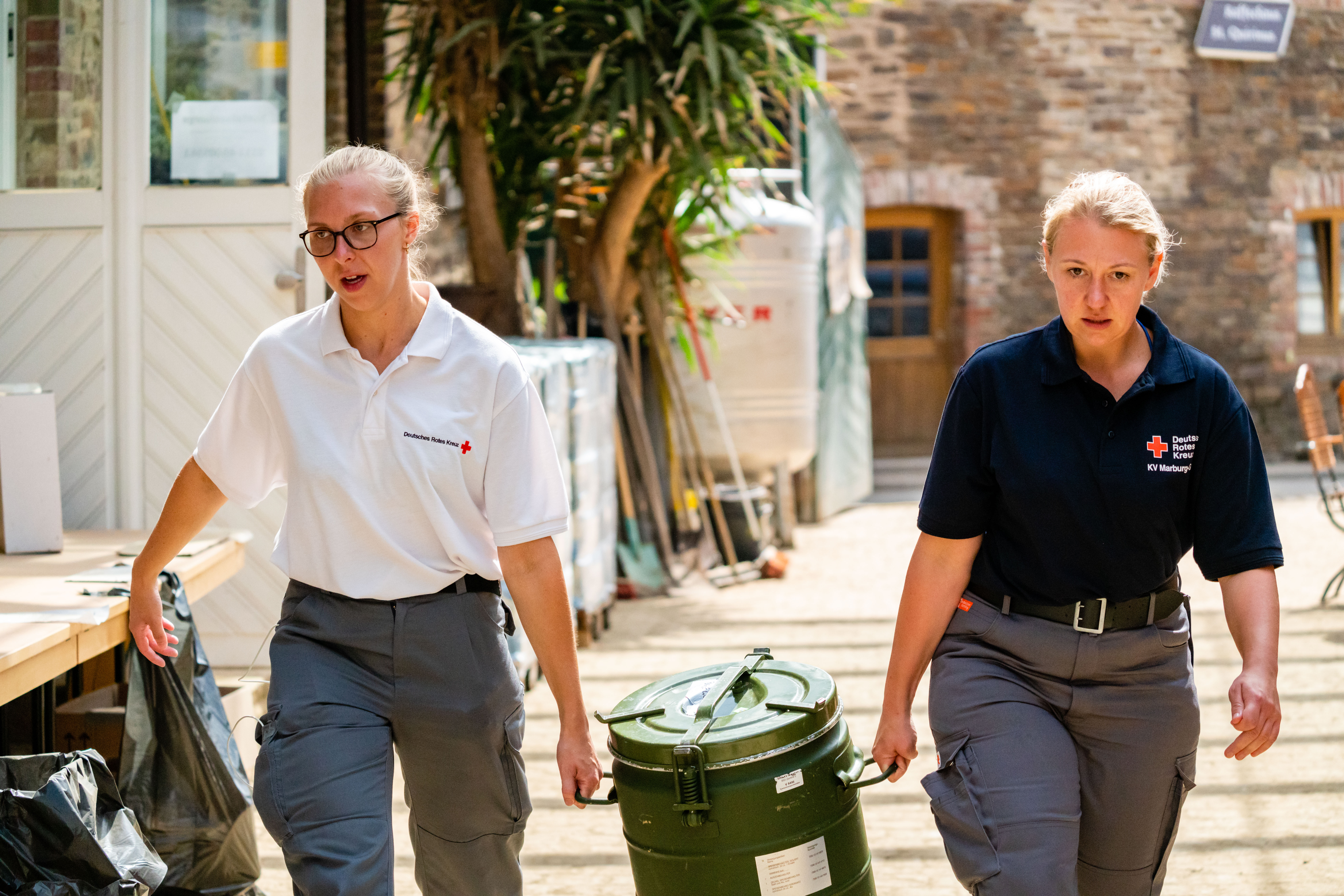Experience in floods response feeding the disaster management system
The extreme weather events in Europe last summer once again sounded the alarm on climate change, with the most severe flooding in decades causing devastating human and material loss in some countries. National Red Cross Societies were at the forefront in helping the people affected, including around 3,500 German Red Cross volunteers who swiftly provided both emergency relief and mid-term rehabilitation items.
The German Red Cross is investing in improving its disaster preparedness. This includes working with communities to comprehend the needs of those at risk, coordinating with national authorities and partners to understand the hazards, training and equipping volunteers, conducting research to improve the response and setting up early warning systems to trigger action before a disaster strikes.
We caught up with Martin von Langenthal, Head of the EU-Civil Protection and Resource Management Unit, who provided insights into the German Red Cross disaster risk management work:
What do you see as the added value of responding at the local level?
Evidence and experience have shown that when communities play an active role in designing and managing programmes and operations, the outcomes are more effective and sustainable. With the right knowledgeable, skills and connection they can bring about the behavioural and social changes needed to address risks and underlying vulnerabilities. During last summer’s flood operations in Germany, we saw great willingness to take part in response and reconstruction activities, for example by clearing out debris or providing food.

It is also important that national civil protection units are trained and equipped to integrate local resources into their operations. During disasters, local German Red Cross branches play an essential role in linking the overarching disaster response to local community efforts.
What kind of challenges have you faced at the local level?
In recent domestic crises such as the floods in the Ahr Valley in 2021, at times the German Red Cross was overwhelmed by the spontaneous support offered by volunteers with no formal training. This led us to develop operational tasks that can be carried out by untrained volunteers, create response teams composed of both trained and untrained personnel and collaborate with private volunteer associations. Nevertheless, some challenges remain, for example work in water treatment facilities or camp management require technical skills.
Collaboration is critically important. What lessons have you learned from past operations and working with authorities and other partners?
During last year’s floods, the German Red Cross was incorporated in the authorities’ crisis management systems and had direct lines of communication with officials, like in all recent domestic operations. Red Cross civil protection experts with medical backgrounds were included to coordinate all actors on the public health aspects of the operation.This decreased complexity and allowed local structures and civil protection capacities to be better aligned, freeing resources and providing better help to the people affected. We could also see the importance of disaster risk reduction and readiness. Joint operational planning and exercises help to build capacities across the different organisations involved in the response. The fact that disaster response in the federal states of Germany is mainly organised at community and district levels ensures sound knowledge of the local environment and resources available.

What kind of good practices do you have in the area of community-based disaster risk management (DRM)?
A good example from outside of Europe is the community-based DRM-programme of the Lebanese Red Cross, which has successfully established and maintained functioning community response structures called Community Emergency Response Teams (CERTs). CERT members are not only trained to respond as “classical” first aiders, but also linked to various civil protection actors mandated by relevant governmental response plans. This way, they are able to effectively kickstart coordination between all relevant actors. Crucial to the functioning of this mechanism is the collection of data by CERT members which are then merged with pre-existing data and made available to different actors. This practice could be replicated for domestic activities in Europe.
The German Red Cross is hosting the Anticipation Hub which focuses on anticipatory humanitarian action. What kind of potential do you see there for Europe?
The German Red Cross has a strong focus on promoting and developing anticipatory action in cooperation with National Societies around the world. The components of anticipation consist of a predefined trigger and pre-agreed early actions and funding. Once a trigger is hit, funding is automatically released. Participatory processes and partnerships with Disaster Management authorities, meteorological offices, scientists and humanitarian actors, are key for setting up good anticipation mechanisms.
However, anticipatory action is not yet receiving the same level of attention domestically. Some instruments were adapted and used in the recent flood response. As a result, the domestic operation benefited from anticipatory capacities within the German Red Cross’ international cooperation department. Yet, it is striking that anticipatory action is far less integrated in our domestic response compared to many countries we cooperate with internationally.
As DRM frameworks are being strengthened EU-wide, how do you see the future of crisis management in Germany and in the EU?
A more centralised approach will always compete with a decentralised, balanced, and well-established setup at community level. Decentralised resources must be carefully integrated to avoid potential overlap. In practical terms, the German Red Cross is implementing a situational control-room that can mobilise resources at the federal level. Yet, response operations are rather run by district and state branches in a decentralised manner and federal support remains limited to data collection, clearing of resources between state and district branches, and reporting to federal authorities.
For media inquiries, please contact Eva Oyón on: eva.oyon@redcross.eu or +32 2 235 09 22

